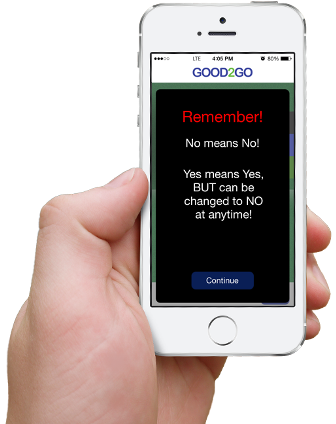back to ba(sex): technology and consent
Consent culture and rape culture: from the Interweb to smart phones, these two foes so often war on the battleground of information communication technologies. Every battle won within the name of consent is a small victory. So when affirmative consent app, Good2Go, was pulled from the market just nine days after its release, it begged the question: ‘OMFG, WHY?’
Developer, Lee Ann Allman made the app in response to the proportion of rapes on American college campuses. It’s believed one in five tertiary education students in the US will suffer some form of sexual assault. Allman had a good idea. But, as pointed out by many, many, many media outlets, its execution has been described as poor… and ‘scary’. That word pops up a lot, too.
The app would log whether or not prospective sexual partners were both willing and able to get it on based on a number of questions regarding interest and sobriety over a four minute period. After determining desire on the first screen – from either ‘No, Thanks’,‘Yes… but we have to talk’, or ‘I’m Good2Go’– a prompt will appear. Rejection results in a message for the partner about no meaning no and how consent can be revoked if a person changes their mind. The second option will pause the process for potential lovers to have a chat. The lattermost of these options will come up with a number of options regarding sobriety: ranging from ‘sober’ to ‘pretty wasted’.
As Yahoo technology columnist, Alyssa Bereznak points out, it’s not every day Apple will remove an app from the market. It has to violate terms and conditions re objectionable and crude content. But ultimately the company exercises considerable discretion when ridding its App Store of products: the company has said the material in Good2Go was not crude. Instead, it’s believed the bad press surrounding Good2Go is what’s caused its revoking. Apple’s decision also prompted Good2Go’s Allman to remove it from the Android and Google Play stores.
The main criticisms of the app revolve around legalities in recording consent and sobriety levels, which would only be released if subpoenaed by a court. It is worried that the inability to change a consent log entry may benefit rapists who proceed if consent status changes after Good2Go’s assessment. Allman’s decision to remove the product herself from Android and Google’s stores is reflective of this critique. She hopes to relaunch the app in coming months with a more educational focus (and consultation from a number of consent educators) rather than making it instructional.
In the past I’ve mulled over how mobile apps and online services can benefit the process of negotiating consent. Take online dating and hook-up apps like Tinder, or sexy survey site Mojo Upgrade, where partners describe how willing they’d be to participate in certain activities. In these situations, consent is not the sole focus, but can be negotiated through indicating interest in a non-threatening environment (indeed, often separately to where their prospective partner is.) It poses the question, in this situation, could the information expressed in these ICTs be some sort of get out of jail card for perpetrators of sexual assault, too?
Just as technology presents big possibilities for consent culture, it poses big problems. Communication is key in any romantic or sexual endeavour. It just comes back to what this politically correct R&B parodist proclaims: ‘sex is a conversation’.


